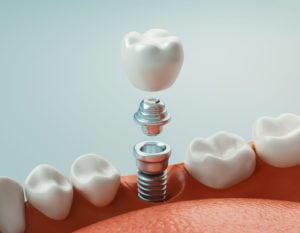The Great Debate: Are Dental Implants Stronger Than Natural Teeth?
December 5, 2023

Dental implants are considered the gold standard for replacing lost teeth because they have unique advantages over other restoration options. It’s the only treatment that includes a surgically inserted titanium rod that essentially functions like a root. This abutment stimulates your jawbone when you chew which keeps it from deteriorating like it normally would when a tooth falls out. That means of all the choices, dental implants look and behave the most like the natural tooth you lost. This leads many patients to wonder which is stronger- a dental implant or the real deal? Keep reading to find out how they compare!
Comparison #1: Longevity
Your teeth are with you your entire life from the moment the first baby tooth erupts through to the end of our lives (or until they fall out!). That means they’re incredibly resilient and were built to last. In fact, they are made of the hardest substances in the human body. The protective outer layer, enamel, is harder than bone and protects the tender pulp inside, for example.
It’d be easy to think that your dental implants couldn’t possibly measure up as far as resiliency, but the truth is that they were also created for the long term. The support pole is made of titanium which is one of the strongest metals available to us. Furthermore, the dental crown is made of durable porcelain and can last anywhere from 10-30 years, which could be the rest of your natural life!
Comparison #2: Decomposition
Though tough, your teeth are weak when it comes to bacteria. Sugar and leftover bits from the food you eat can cling to their porous surfaces which attracts toxic microbes. These emit acids which can erode your enamel and result in cavities.
Dental implants, however, are capped with a crown often made of porcelain, composite resin, or metal alloys. All of these are less porous materials and because they are inorganic, cannot decay like your pearly whites do. That’s not to say you’ll never have to brush your teeth again. It’s still possible for them to become infected around or below your gumline, so it’s imperative to maintain your twice-daily brushing and flossing routine. Otherwise, you might develop complications like gum disease or even implant failure.
Comparison #3: Durability
As hardy as they are, your natural teeth can still chip, crack, or break. Years worth of chewing or subconscious grinding can wear them down so they’re vulnerable to injury. Once something happens, the structure of your tooth is impaired and must be repaired or replaced to avoid tooth decay or additional damage.
Dental implants can also be harmed if used incorrectly. The titanium rod isn’t a problem, but the crown on top can be hurt. To keep your restoration in prime condition, you should avoid using it to open packages, chew on hard or inanimate objects, or bite your nails.
Although they’re quite different from your natural teeth, dental implants are the closest you’ll get to their equivalent replacement!
About the Author
Dr. Hiren H. Shah takes pride in playing an integral role in transforming his patients’ lives by enhancing their smiles. He attended Rutgers University for his undergraduate degree and then completed his dental doctorate at New York University. He has expertise in a full range of services including 1000+ hours of advanced education in dental implants. If you’d like to request a consultation, you’re welcome to contact the office on the website or by calling (908) 834-8448.
No Comments
No comments yet.
RSS feed for comments on this post.
Sorry, the comment form is closed at this time.
